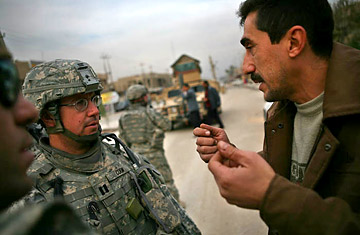
Captain Cook speaks with a resident of Dora, Iraq.
(2 of 2)
When he is out on patrol, primary schoolchildren dash across the street to greet Cook, running past armed neighborhood guards to proudly show him their report cards. "Hellow meestah Cook!" they shout. "Zien, zien!" Cook says, ("good, good") encouraging them in Arabic. Armed plainclothes gunmen — volunteers Cook helped organize — checked inside cars passing through the crosswalk.
Just at that moment the mosque behind the school blares out the noontime call to prayer. "You never would have seen this a year ago," says Cook. He knows the mosque leaders well and has met almost daily with them since arriving. "When you meet him you know he's a holy man," he says of the blind imam in the nearby mosque. "The government is not coming here," says Cook. "You can't help but understand their desperation. If we don't stay here to help and maintain the infrastructure there is going to be no sustained progress."
The unit has come to know the neighborhood in a way that would have been unthinkable just after the war, or even into 2004 and 2005. In fact, the U.S. military has never secured Iraq or controlled it so completely as it has today, and never before has their wealth of intelligence and ability to analyze it been better. And yet never before has the military looked and acted less like a fighting force than does today. "The problems that we have to worry about now — making sure the volunteers posted at the girls' high school don't stare at the young ladies — are a lot different from when we first arrived," says Cook.
Cook and his men spend their days haranguing shady contractors, sending requests to government ministries for assistance, dragging community leaders to meetings, finding medicine for checking on home deeds from people who have recently moved in, learning the minutiae of Iraq's complicated ration card system, setting up neighborhood councils, and sometimes just lending an ear.
The neighborhood still has a long way to go. It has just two entrances, only one of which residents feel safe enough driving in and out of. Some residents approach Cook to ask for help, or an application for a small grant. But many deliver cold, hard stares from a distance. And as safe as it is now, soldiers still wouldn't recommend a foreigner walk down the street without a flack jacket and a helmet.
Cook is now concerned about larger issues, such as the central government's failure to maintain the U.S. financed school improvements and to allow the clinic they funded to stay open 24-hours. The government is also balking at incorporating the dozens of armed volunteer Sunni neighborhood watchmen into the Iraqi police.
The days of decapitated heads, rocket-propelled grenades and small arms fire are still fresh in the minds of Dora's residents. Whether they will become a thing of the past never to return is anyone's guess. "My feeling is that those days are over. But will life ever really improve here?" asks Cook. "That's up to the government."
